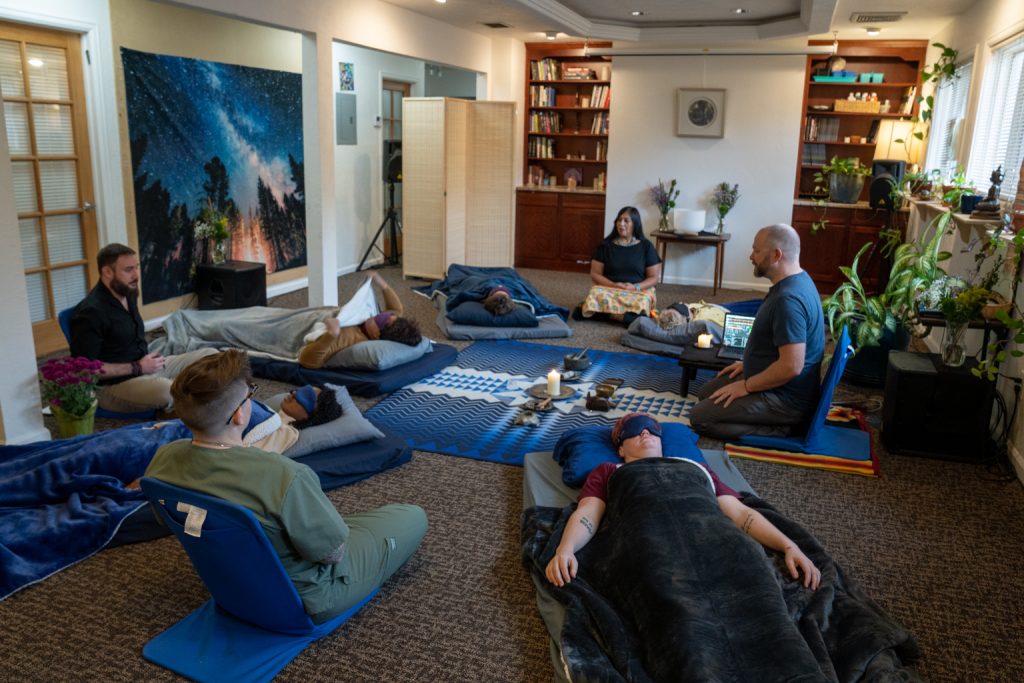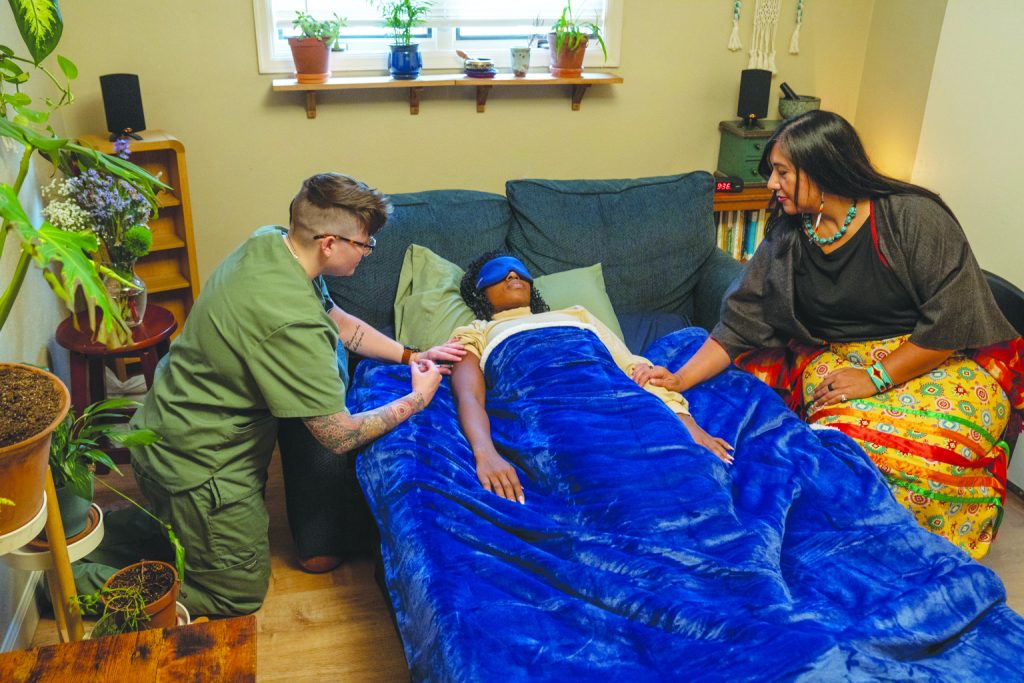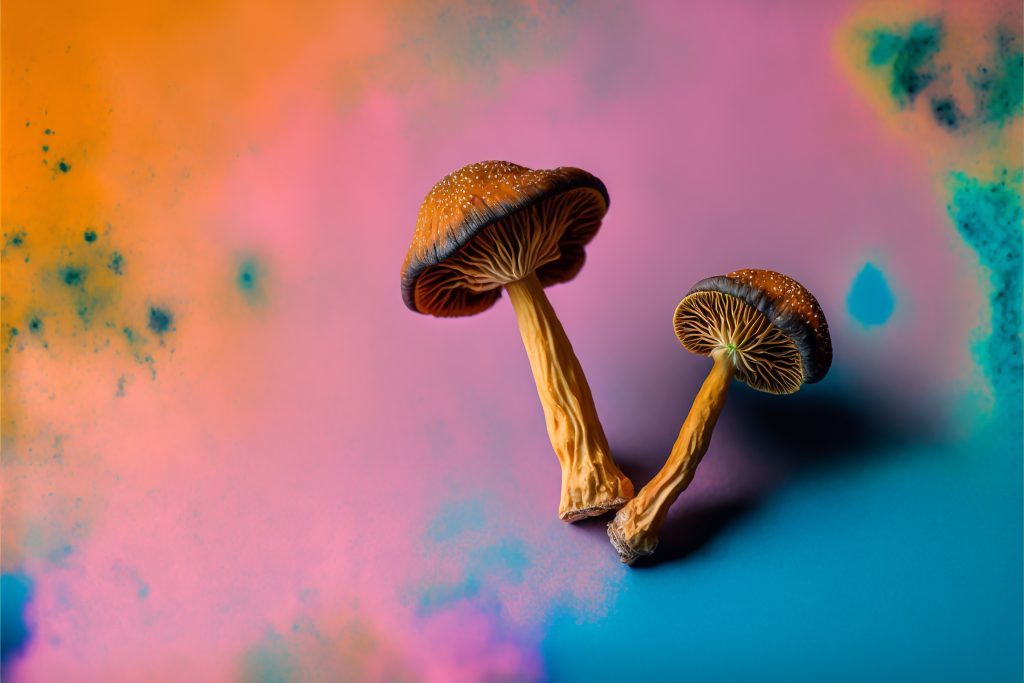
From shamans to social workers, there will soon be a new generation of certified trip sitters.
That’s not the official name, of course, but draft rules under Colorado’s Natural Medicine Health Act — to be finalized no later than the end of this year but likely sooner, with a final public hearing scheduled for May 3 — lay out the path for licensure of general and clinical facilitators who will be able to work with psilocybin, the active ingredient in magic mushrooms.
The new rules for facilitators represent a major shift, bringing psychedelic treatment out from the underground. Already, local organizations are prepping their coursework and launching programs.
Naropa University aims to have 60 trainees in the inaugural year for its psilocybin facilitator training program, which opened applications May 1. The Psychedelic Sitters School has already graduated 40 people from its psilocybin guide training using a personal use model and plans to roll out a licensed facilitator track soon.
“It takes the fear of prohibition and incarceration out of the picture,” says Daniel McQueen, executive director and founder of Boulder’s Psychedelic Sitters School. “I had good teachers, but it was underground or learning things on the side when I was at Naropa. There were no classes in psychedelics, but we figured out how to get our education.”
He says the new regulations bring the work “into the light of accountability.”
Still, some say the regulations are incomplete — or don’t fit the medicine at all.
“We’re trying to fit plant medicines in the colonial model. It’s such an inconsistency,” says Ana Medina, a mestiza woman from Mexico City who lives in Boulder. She’s a board member with community organizing and educational network Mycoalition, which promotes responsible psychedelic stewardship, and works closely with the Native Coalition, a grassroots movement of native people advocating for protection of the medicine.
Medina is a natural medicine practitioner, life coach, sound healer and cofounder of the New Paradigm Mystery School, an eight-month “experiential program facilitating brave space for leaders in the psychedelic world.” She recently closed it down temporarily to attend Naropa’s Psychedelic Assisted Therapies program to ensure she has the proper credentialing. She says she’s going to the Naropa program “kicking and screaming.”
“On the one hand, I need to survive. I need to keep doing my work,” she says. “And if I need to work within the system, I’ll go get their piece of paper. But on the other hand, it feels a little bit like self betrayal.”
“I really, really think the people that need to be centered and teaching about these plant medicines are the Indigenous people.”
Stepping into the work
With regulations still in their draft form as programs are built, organizations are making different calculations about how they can create curriculum and get trainees certified.
Naropa’s program is already accredited under Oregon regulations, and Diana Quinn, who led the creation of the program, says that Colorado’s Department of Regulatory Agencies’ (DORA) plans for reciprocity for facilitators across state lines should make it easy to transfer licenses to Colorado — and get the program approved once the rules are finalized.
“We anticipate that, with minimal modifications, we should be able to apply and receive accreditation,” says Quinn, who serves as director of clinical education at Naropa’s Center for Psychedelic Studies.

McQueen says the bulk of his future licensed facilitator program is built and will just need to be put into the format required by the draft rules. McQueen also founded the Center for Medicinal Mindfulness, a psychedelic therapy center in South Boulder that is home to the Psychedelic Sitters School.
The organization, which currently works with cannabis, ketamine, DMT and psilocybin, first opened its doors 12 years ago under a personal use model with cannabis.
“We’ve been doing this for a while with the intention that when mushrooms became legal, we would step into that work,” McQueen says.
Personal use under the Natural Medicine Health Act allows adults to share mushrooms for “counseling, spiritual guidance, beneficial community-based use and healing, supported use, or related services.”
Powerful medicine, feeble rules
As far as who can become a facilitator, “the door is very open,” in the current Oregon regulations, Quinn says. That’s the case for the draft Colorado rules, too: Anyone over 21 years old who completes the required training can apply for licensure. The draft regulations name acupuncturists, massage therapists, and Indigenous and religious practitioners as potential future facilitators.
Clinical facilitators, including MDs, social workers, psychologists and addiction counselors, must already hold a behavioral, mental health or medical license and will be licensed to work with diagnoses within their scope of practice.
The openness of who can become a facilitator is both a good and a bad thing — depending on who you ask and how you think about it.
“It’s good from the perspective of the people that have already been working with a medicine and have a very deep relationship with it, that they don’t have to be therapists. That’s great because we have other training,” Medina says. “It is not good from the perspective of the 20-something year old that will just decide to go do it and not be a therapist and not have experience and not have training.”
Quinn says “it requires an extremely high level of integrity to be worthy and equipped to do this work within an ethical scope of competency.”
“This work, and psychedelics in general as they’ve been mainstreamed, have become very, very visible, very attractive; oftentimes promoted as a panacea of benefits without maybe a balanced view of the weight of what this work is,” Quinn says. “These medicines are very powerful.”
McQueen thinks the draft standards fall short in terms of assessing the mental health and psychological maturity of the guides, as well as the amount of training needed to become licensed.
“We’re asking our guides to be psychonauts,” McQueen adds. “Do they have the capacity to be a psychonaut? Sometimes it’s not a no, it’s just not yet.”
The draft rules require 150 hours of academic instruction, broken down into topics like trauma-informed care, integration, and Indigenous, social and cultural considerations, as well as 40 hours of practicum and 50 hours of consultation.
“150 hours is not enough,” McQueen says, pointing out that becoming a licensed hairdresser requires 1,200 hours of training. “It’s kind of demeaning to the profession. There’s a lot you can do in these spaces that the model doesn’t have even an awareness of.”
A decolonized experience
Another area of weakness some see in the regulations is the lack of focus on Indigenous practice and history. The draft rules currently require 10 hours of Indigenous history and cultural study, something Medina says barely scratches the surface.
“Not even a full two days on millennia of use of these medicines, millennia of connecting with these plant spirits,” she says. “To even connect with the medicines in the right way, I think people need to understand the spirit world, and that’s not something you do in a day. That’s a relationship you develop over years.”
She says Indigenous teachers and practices should be centered, and that programs owe reciprocity to Mazatec healer Maria Sabina and her Indigenous community in Mexico. Sabina is known as the first person to allow Westerners to participate in the velada, a sacred ritual with psilocybin mushrooms. The events that ensued, which include Sabina’s identity being revealed without her permission and her house being burnt down, are described by one journal article as a “story of extraction, cultural appropriation, bioprospecting, and colonization.”

“We’re building a whole psychedelic movement on extractivism,” Medina says.
She also worries that the new regulations won’t take into account cultural practices, resulting in Indigenous practitioners being shut out.
“The mindset with which they are creating the regulations is not inclusive of the mindset of Indigenous people and how they connect with the medicine, with their communities and with their people,” she says.
At the New Paradigm, Medina says she specifically told people it was not a practitioner training, but rather about connecting with the roots of their ancestry, “deepening a relationship with the Earth and with the medicines and really getting in touch with what the calling actually is.”
“A decolonized model is a model to connect with yourself and really true yourself up in the relationship with a medicine,” she says. “That is not a career or a business. It isn’t. These are plant spirits, and when people say the psilocybin industry or the natural medicine industry, it just curls my blood from the inside.”
'Co-opting spirituality'
Quinn, who identifies as queer and mestizo Chicana, says she came to Naropa after “seeing the places in psychedelic-assisted therapy training that were lacking, particularly around an emphasis in Indigenous reciprocity and reparations around inclusivity and equity for historically excluded groups of people, like people of the global majority, people of color and LGBTQ folks.”
She notes that Proposition 122, which created the Natural Medicine Health Act, “was highly controversial, particularly among many Indigenous communities throughout Colorado.” The citizen-led initiative passed 54% to 46% in 2022.
Quinn also has worries about the accessibility of training programs.
“What I don’t want to see is this only available to people with wealth and resources,” she says. “It’s great to have decriminalization and this hybrid facilitator, state regulatory model, because ideally it would bring the work out from the underground and create more safety. But if it impedes accessibility or is only available to the elite few, then that hasn’t solved the problem.”

Still, she thinks there’s a need for oversight.
“As someone who has a heavy, heavy emphasis on liberatory harm reduction and healing justice and was comfortable operating outside of the clinical medical model, I do think there needs to be oversight and some kind of standards for ethical delivery of care,” Quinn says, “because sometimes some of the fringe approaches to psychedelic work can be not for everyone, not safe for everyone.”
Naropa’s program will teach within a decolonial framework that “problematizes even the existence of this work that we’re embarking on,” Quinn says. All of the lead educators for the Naropa program are members of BIPOC or LGBTQ communities, and the program will open with teachings from Mazatec speakers about “Mazatec roots of the unbroken lineage of 5,000 years of work with the sacred mushroom.”
“We will be very much grounding our examination of the context to include questioning on: What even is the psychedelic renaissance within this sort of neoliberal, colonial moment?” Quinn says. “What does it mean to do this work in a good way? Is that possible? How can we approach it?”
McQueen says Psychedelic Sitters School includes conversations around cultural appropriation, how to work with different communities, the lineage of how mushrooms were introduced to American culture, and how they’ve been used across time and geography.
“There’s a lot of different religious practices represented in our community already,” McQueen says. “We teach people if you’re gonna use a practice from a different tradition, do you have any education and training and are you connected to that community?
“How do you have your own expression of your own spirituality without co-opting somebody else’s?”
Medina says her goal after completing the Naropa training is “creating a program that will hopefully be inside the regulations but also give people what’s in my heart.”
“My challenge now is how to create a curriculum that is real, that is giving people what they really need within a system that does not understand what that is. I am an educator at heart, and it just seems like this is the time to be educating people.”
‘Do it right’
For Quinn, Medina and McQueen, being a good facilitator goes beyond what’s required in the regulations.
Quinn says that while Naropa’s current offering is an eight-month program, she hopes it will eventually expand, and the university wants to open its own healing center where students can complete practicum requirements and apprenticeships.
“This training, while it meets the recommended criteria set by state regulatory programs, is really just the beginning of what I would like to see built out as a multi-year apprenticeship and training model,” she says. “We want to try and raise the bar on what is understood as best practice for doing this work under a state regulatory model.”
At the Psychedelic Sitters School, students are required to take the organization’s psychedelic guide training before starting the psilocybin specialty. That’s an estimated total 400-500 hours, McQueen says, far beyond what the state requires. They also look out for things like psychedelic overuse, psychotic traits, emotional disregulation and whether someone is a good steward of ethics and boundaries.

“We want to really be mindful that it’s way more complicated than just giving somebody a substance and sitting there while they trip,” he says. “There’s a lot more going on in these spaces. And sometimes people who aren’t trained don’t know that.”
Quinn, McQueen and Medina all say that those looking to pursue a facilitator certificate should be asking themselves why they want to do this work, what healing they still need to do personally and what their areas of vulnerability are.
“I feel like these are the kinds of questions that people who do this work should be asking ourselves all the time,” Quinn says.
Among the traits she would like to see in applicants to the program are maturity, trustworthiness, respect for the power of the medicine, reverence for their lineages, social justice awareness and commitment to community.
“We’re really trying to emphasize access for folks that have some kind of foundation in a community care or can demonstrate that they have a commitment to reliability, responsibility, care for their community. This is a high level of responsibility for people in really vulnerable states,” she says.
Medina adds that it’s not all “love and light.”
“It requires people doing their own work — deep, deep, deep work. It could take you to grief like you’ve never seen before. It can take you to your trauma,” she says. “Then learning culturally where these medicines come from and finding elders — it’s no joke.
“I don’t think people realize — they realize what they’re getting into from the colonized model. They don’t realize what they should be getting into if they want to do it right."
Check out this story for advice on how to choose a facilitator for your own psychedelic experience.
